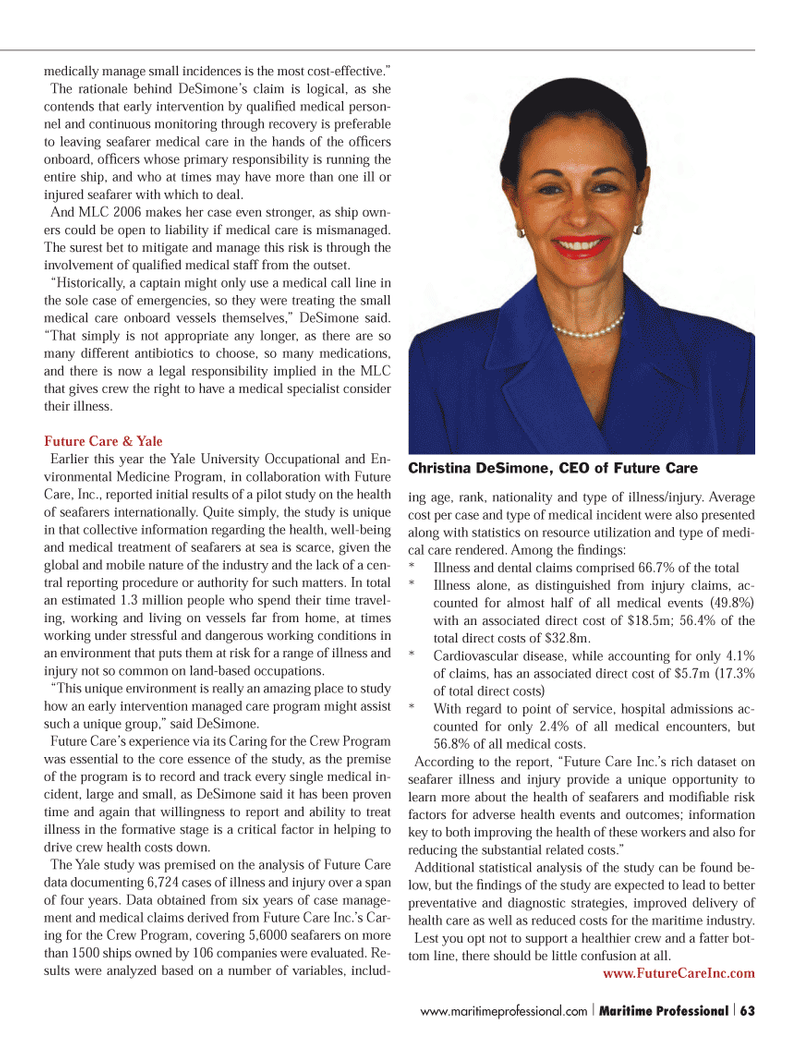
Page 63: of Maritime Logistics Professional Magazine (Q3 2013)
Training & Security
Read this page in Pdf, Flash or Html5 edition of Q3 2013 Maritime Logistics Professional Magazine
medically manage small incidences is the most cost-effective.? The rationale behind DeSimone?s claim is logical, as she contends that early intervention by quali ed medical person- nel and continuous monitoring through recovery is preferable to leaving seafarer medical care in the hands of the of cers onboard, of cers whose primary responsibility is running the entire ship, and who at times may have more than one ill or injured seafarer with which to deal. And MLC 2006 makes her case even stronger, as ship own- ers could be open to liability if medical care is mismanaged. The surest bet to mitigate and manage this risk is through the involvement of quali ed medical staff from the outset. ?Historically, a captain might only use a medical call line in the sole case of emergencies, so they were treating the small medical care onboard vessels themselves,? DeSimone said. ?That simply is not appropriate any longer, as there are so many different antibiotics to choose, so many medications, and there is now a legal responsibility implied in the MLC that gives crew the right to have a medical specialist consider their illness. Future Care & Yale Earlier this year the Yale University Occupational and En- vironmental Medicine Program, in collaboration with Future Care, Inc., reported initial results of a pilot study on the health of seafarers internationally. Quite simply, the study is unique in that collective information regarding the health, well-being and medical treatment of seafarers at sea is scarce, given the global and mobile nature of the industry and the lack of a cen-tral reporting procedure or authority for such matters. In total an estimated 1.3 million people who spend their time travel- ing, working and living on vessels far from home, at times working under stressful and dangerous working conditions in an environment that puts them at risk for a range of illness and injury not so common on land-based occupations.?This unique environment is really an amazing place to study how an early intervention managed care program might assist such a unique group,? said DeSimone. Future Care?s experience via its Caring for the Crew Program was essential to the core essence of the study, as the premise of the program is to record and track every single medical in- cident, large and small, as DeSimone said it has been proven time and again that willingness to report and ability to treat illness in the formative stage is a critical factor in helping to drive crew health costs down. The Yale study was premised on the analysis of Future Care data documenting 6,724 cases of illness and injury over a span of four years. Data obtained from six years of case manage-ment and medical claims derived from Future Care Inc.?s Car- ing for the Crew Program, covering 5,6000 seafarers on more than 1500 ships owned by 106 companies were evaluated. Re- sults were analyzed based on a number of variables, includ- ing age, rank, nationality and type of illness/injury. Average cost per case and type of medical incident were also presented along with statistics on resource utilization and type of medi-cal care rendered. Among the ndings:* Illness and dental claims comprised 66.7% of the total * Illness alone, as distinguished from injury claims, ac- counted for almost half of all medical events (49.8%) with an associated direct cost of $18.5m; 56.4% of the total direct costs of $32.8m.* Cardiovascular disease, while accounting for only 4.1% of claims, has an associated direct cost of $5.7m (17.3% of total direct costs)* With regard to point of service, hospital admissions ac- counted for only 2.4% of all medical encounters, but 56.8% of all medical costs.According to the report, ?Future Care Inc.?s rich dataset on seafarer illness and injury provide a unique opportunity to learn more about the health of seafarers and modi able risk factors for adverse health events and outcomes; information key to both improving the health of these workers and also for reducing the substantial related costs.? Additional statistical analysis of the study can be found be-low, but the ndings of the study are expected to lead to better preventative and diagnostic strategies, improved delivery of health care as well as reduced costs for the maritime industry. Lest you opt not to support a healthier crew and a fatter bot- tom line, there should be little confusion at all.www.FutureCareInc.com Christina DeSimone, CEO of Future Care www.maritimeprofessional.com | Maritime Professional | 63MP #3 50-63.indd 63MP #3 50-63.indd 639/10/2013 2:38:13 PM9/10/2013 2:38:13 PM

 62
62

 64
64
